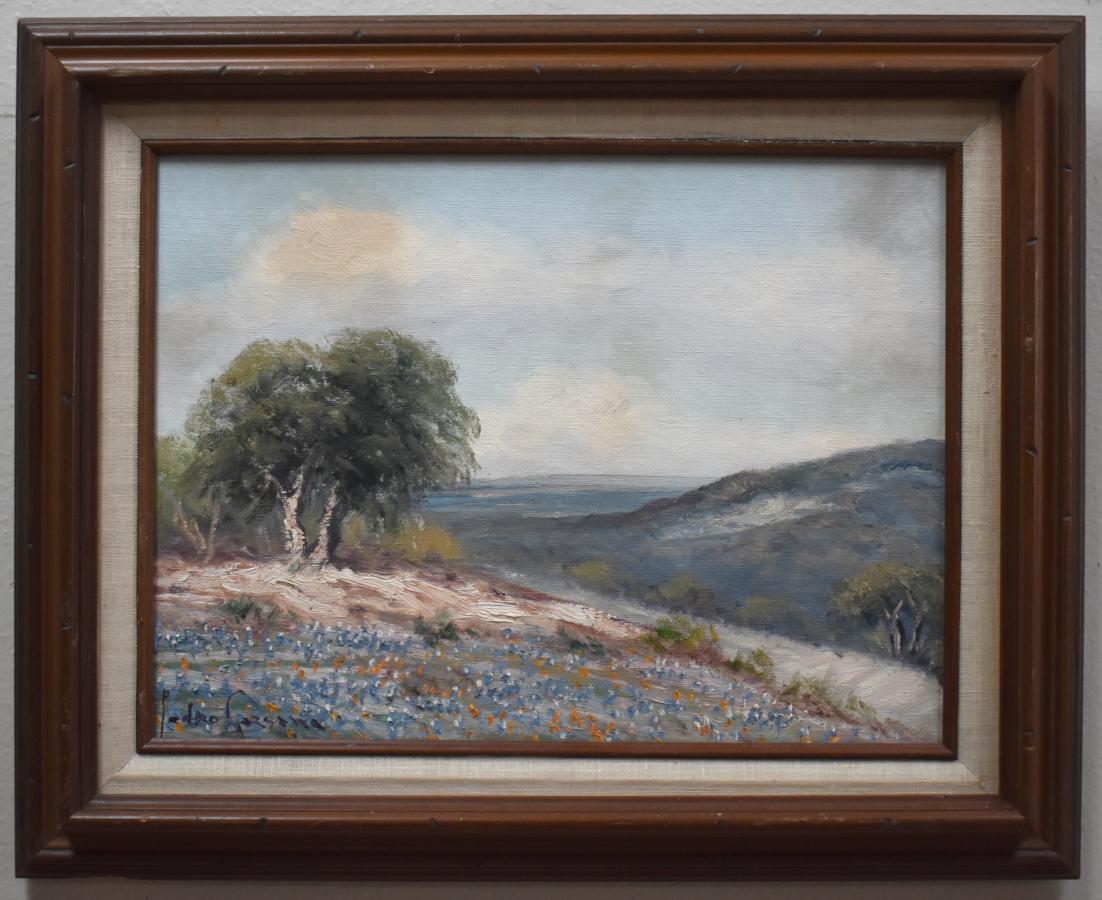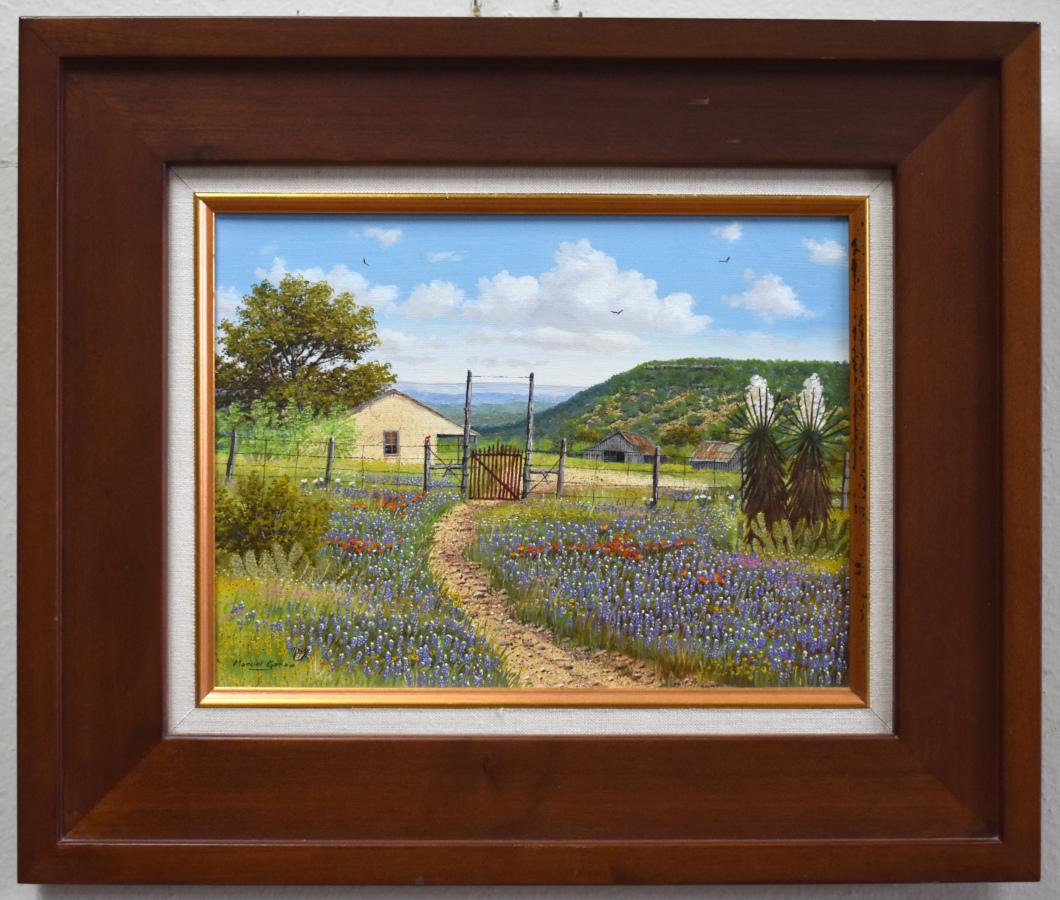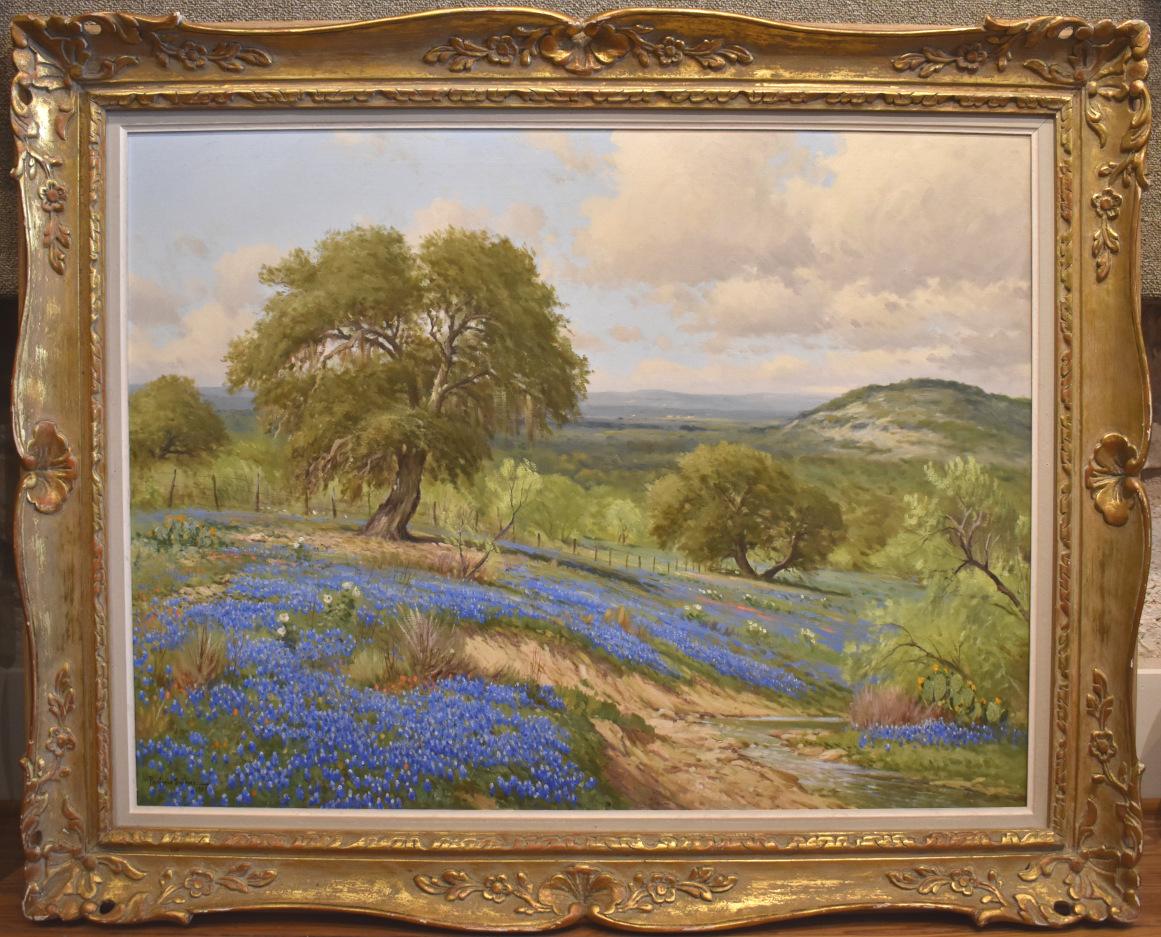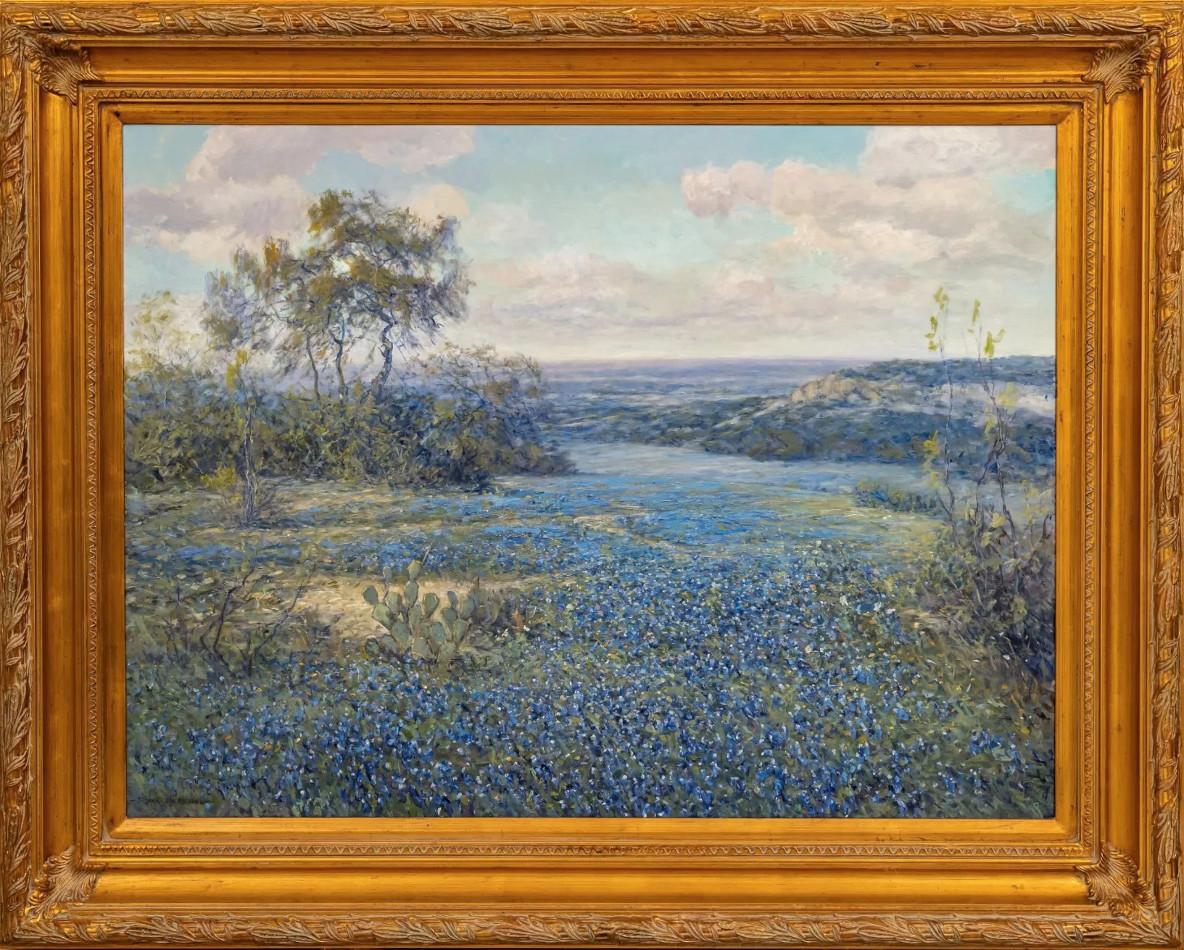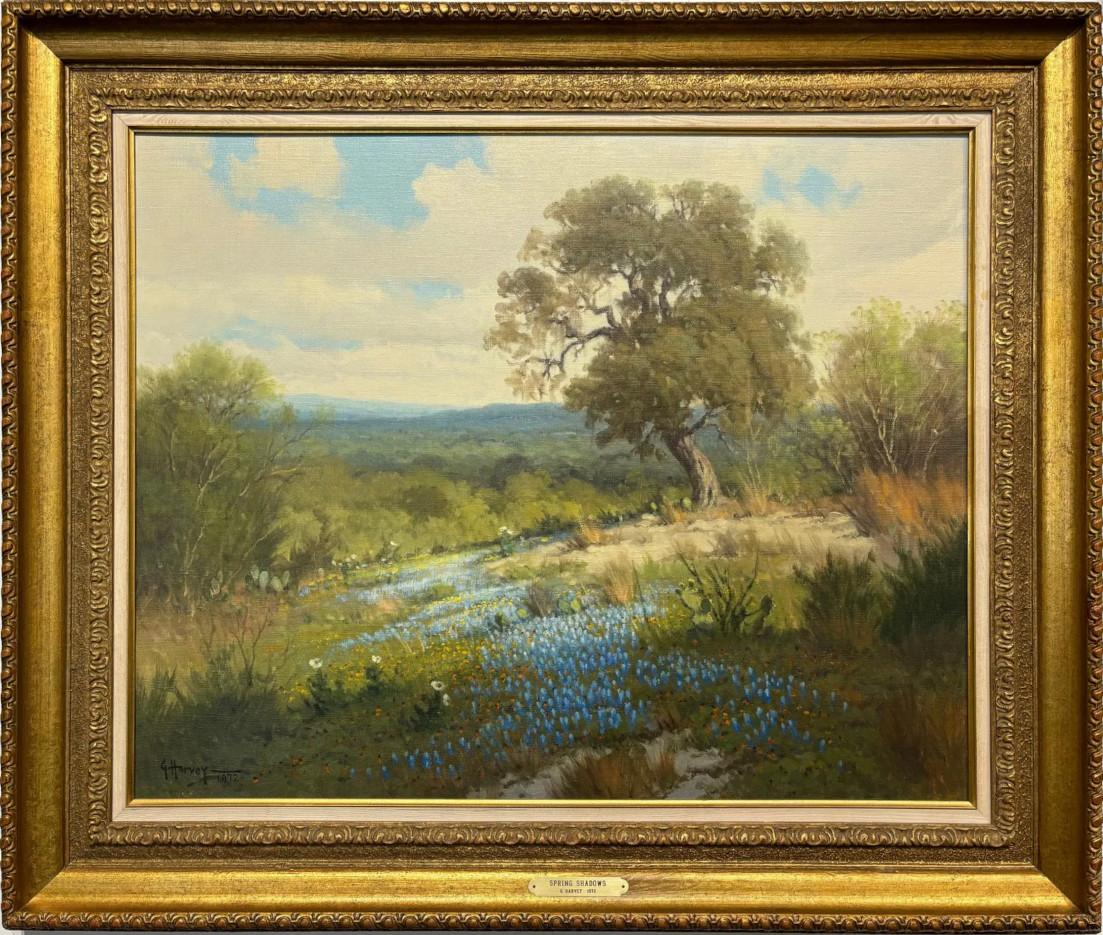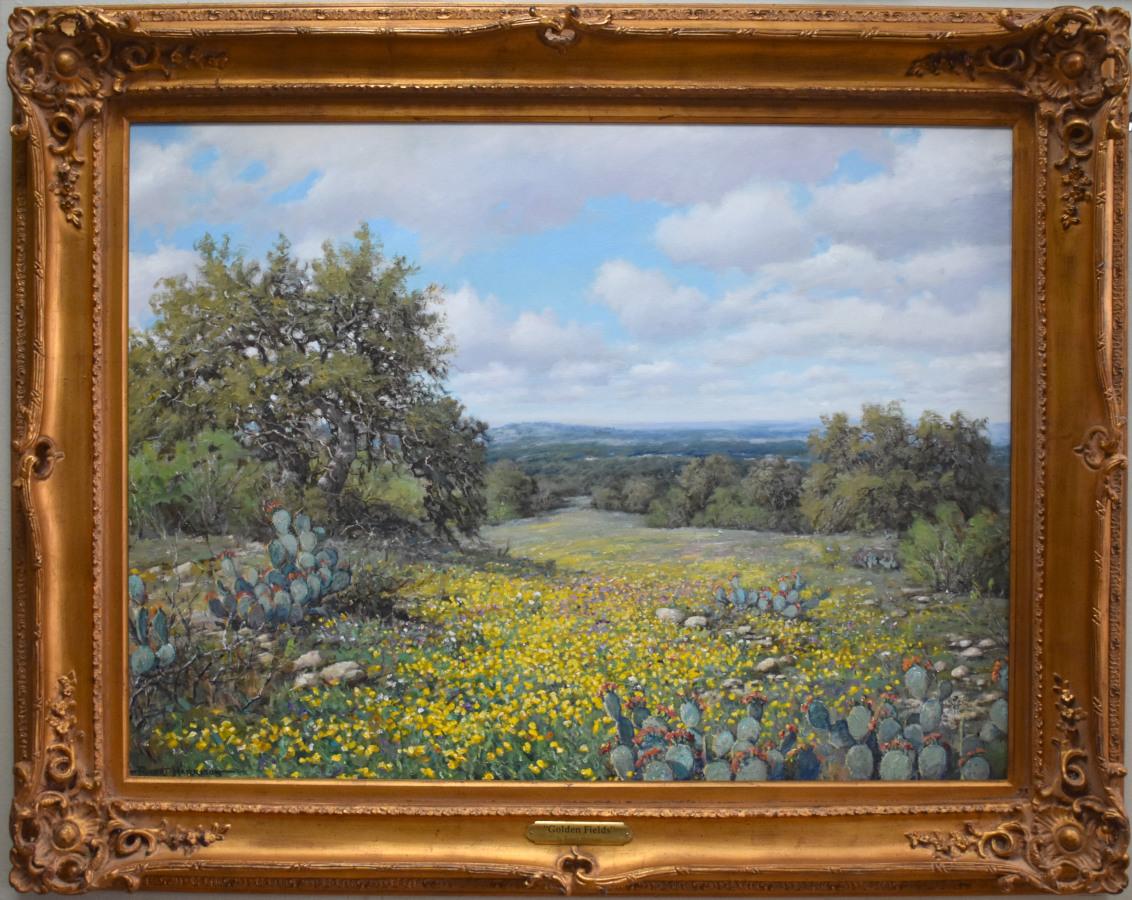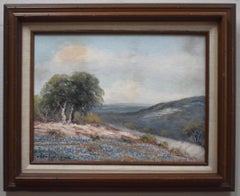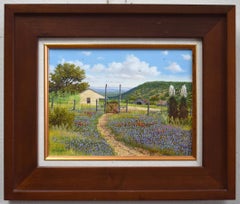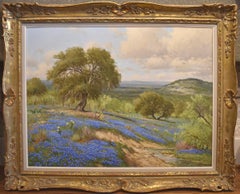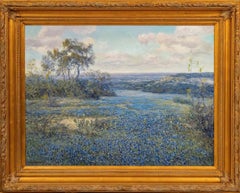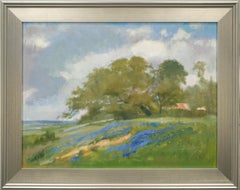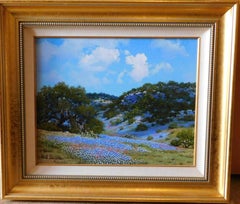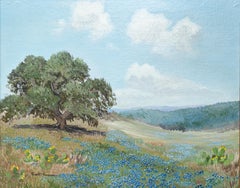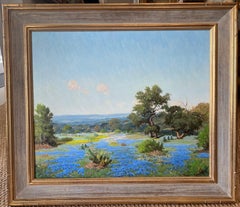Items Similar to "BLUEBONNET AND HUISACHE" TEXAS HILL COUNTRY FRAMED 23 X 27
Want more images or videos?
Request additional images or videos from the seller
1 of 6
Pedro Lazcano"BLUEBONNET AND HUISACHE" TEXAS HILL COUNTRY FRAMED 23 X 27Circa 1960
Circa 1960
$1,678
£1,260.56
€1,453.63
CA$2,328.44
A$2,587.41
CHF 1,355.83
MX$31,730.03
NOK 17,292.86
SEK 16,268.49
DKK 10,849.29
Shipping
Retrieving quote...The 1stDibs Promise:
Authenticity Guarantee,
Money-Back Guarantee,
24-Hour Cancellation
About the Item
Pedro Lazcano
(1909-1970)
San Antonio Artist
Image Size: 16 x 20
Frame Size: 23 x 27
Medium: Oil on Canvas
"Bluebonnet and Huisache" Texas Hill Country
Pedro Lazcano (1909-1970)
I was always curious about Pedro Lazcano's background but never could find much information. Lazcano and Porfirio Salinas were painting and drinking buddies. I have found out bits and pieces from a few of my customers as well as a couple of Lazcano's relatives. A gentleman came into my gallery a few years ago. He spotted a Lazcano Landscape. He identified it from across the room. He had been in the oil business in the 1950s-60s. He had an office in the Tower Life building in San Antonio. He told me an interesting story about two artists. He said that two artists would come around the offices in the building every month or so trying to peddle their artwork. One was a skinny guy, and one was a little chubby. They were desperate to sell their paintings. Even though the prices were cheap the oil man wasn't finding much oil and couldn't afford to spend money on paintings. He said his rent on the office was about the same as the price for the paintings and they would have to pay the rent and pass on the art. The two artists said they would sell them for the same amount as their suite number. Their suite number was 24. They would offer their paintings to him for $24.00. The oil man still didn't buy any. After a few years of the two of them coming around one stopped coming. The skinny one kept coming around. The oilman asked what happened to the chubbier one. The skinny one said that his friend's paintings had started to sell pretty regularly, and he didn't have to knock on as many doors. You have probably guessed by now. The skinny guy was Pedro Lazcano and the chubby guy was Porfirio Salinas. I also had dealings with a son of Lazcano. Unfortunately, he didn't go into great detail about his father's life. He did tell me that prior to Lazcano becoming a full-time artist that he was an engraver for a San Antonio engraving company. After many, many years with the engraving company, with the advent of better technology, Lazcano's skills were replaced by a machine. Lazcano's position with the company was eliminated and he was left with only his artwork to try to sell to support his family. The son stated that if Lazcano didn't sell a painting or two every day that the family would not eat. He also claimed that for the last 10 years or so of his life he had a Lone Star beer in one hand and a paint brush in the other. While the son was in my gallery, he called his mother (Lazcano's wife). She told that him that Lazcano and Salinas went many times somewhere North of San Antonio to study with Robert Wood.
- Creator:Pedro Lazcano (1909 - 1970, American)
- Creation Year:Circa 1960
- Dimensions:Height: 16 in (40.64 cm)Width: 20 in (50.8 cm)Depth: 2 in (5.08 cm)
- More Editions & Sizes:Image Size: 16 x 20 Frame Size: 23 x 27Price: $1,678
- Medium:
- Movement & Style:
- Period:
- Framing:Frame IncludedFraming Options Available
- Condition:Please visit my 1stdibs storefront for a large selection of Vintage, Mid Century, and Contemporary Texas Art, paintings, Sculptures, pottery & more. Charles Morin Fine Art.
- Gallery Location:San Antonio, TX
- Reference Number:1stDibs: LU769314150172
About the Seller
5.0
Vetted Professional Seller
Every seller passes strict standards for authenticity and reliability
Established in 1974
1stDibs seller since 2017
99 sales on 1stDibs
Typical response time: 1 hour
- ShippingRetrieving quote...Shipping from: San Antonio, TX
- Return Policy
Authenticity Guarantee
In the unlikely event there’s an issue with an item’s authenticity, contact us within 1 year for a full refund. DetailsMoney-Back Guarantee
If your item is not as described, is damaged in transit, or does not arrive, contact us within 7 days for a full refund. Details24-Hour Cancellation
You have a 24-hour grace period in which to reconsider your purchase, with no questions asked.Vetted Professional Sellers
Our world-class sellers must adhere to strict standards for service and quality, maintaining the integrity of our listings.Price-Match Guarantee
If you find that a seller listed the same item for a lower price elsewhere, we’ll match it.Trusted Global Delivery
Our best-in-class carrier network provides specialized shipping options worldwide, including custom delivery.More From This Seller
View All"BLUEBONNET HILLTOP" TEXAS HILL COUNTRY FRAMED 17.25 X 21.25
By Pedro Lazcano
Located in San Antonio, TX
Pedro Lazcano
(1909-1970)
San Antonio Artist
Image Size: 12 x 16
Frame Size: 17.25 x 21.25
Medium: Oil
"Bluebonnet Hill Top"
Pedro Lazcano (1909-1970)
I was always curious about Pedr...
Category
1960s Impressionist Landscape Paintings
Materials
Oil
"BLUEBONNET FENCE" TEXAS HILL COUNTRY FRAMED 15.25 X 18.25
By Manuel Garza
Located in San Antonio, TX
Manuel Garza
(Born 1949)
Texas Artist
Image Size: 9 x 12
Frame Size: 15.25 x 18.25
Medium: Oil on Canvas
"Bluebonnet Fence"
Biography
Manuel Garza (Born 1949)
Growing up in Central T...
Category
20th Century Impressionist Landscape Paintings
Materials
Oil
"Bluebonnet Creek" Texas Hill Country 1957 39 x 49 Framed!!!
By Porfirio Salinas
Located in San Antonio, TX
Porfirio Salinas
(1910-1973)
San Antonio Artist
Image Size: 30 x 40
Frame Size: 39 x 49
Medium: Oil on Canvas
Dated 1957
"Bluebonnet Creek" Texas Hill Country
Biography
Porfirio Salinas (1910-1973)
Porfirio Salinas was a self-taught artist who painted landscapes of Central Texas with an emphasis on the vast bluebonnet fields that grow there in the springtime. Born in 1910 in Bastrop, Texas, he attended public schools in San Antonio. He also observed works in progress by the director of the San Antonio Art School, Jose Arpa, as well as landscape painter, Robert Wood. Wood is said to have paid Salinas five dollars a picture to paint bluebonnets because "he hated to paint bluebonnets". Salinas served in the military from 1943 to 1945. Although he was assigned to Fort Sam Houston, he was allowed to live at home. At the fort, Colonel Telesphor Gottchalk assigned him to paint murals for the officer's lounge and various other projects, and Salinas continued to be able to paint during his entire conscripted period. Even before he achieved notoriety among galleries, dealers, and museums, Salinas was widely followed and appreciated by many Texans, including former President Lyndon B. Johnson, who may be considered responsible for launching Salinas popularity beyond the boundaries of Texas. In 1973, Texas capital, Austin, honored Salinas for having "done much to bring the culture of Mexico and Texas closer together with his paintings". Salinas died in April 1973 in San Antonio, Texas.
From
the years of the Great Depression through President Lyndon Johnson's
Great Society of the 1960s, Texan Porfirio Salinas (1910-1973) remained
one of the Lone Star State's most popular artists. Today, his works
remain popular with Texas collectors and those who love landscapes of
the beautiful "Hill Country" that lies in the center of the
state. One of the first Mexican American painters to become
widely recognized for his art, Salinas was a favorite of President
Lyndon Johnson and his wife, Lady Bird Johnson, as well as of Sam
Rayburn, the longest-serving Speaker of the House of Representatives,
and Texas Governor John Connelly. In fact, President Johnson was so
enamored with his Salinas paintings that the artist will forever be
associated with America's first Texas-born President. Works by Porfirio
Salinas are in a number of museum collections, grace the halls of the
Texas State Capitol and the Governor's Mansion in Austin, and are
included in virtually every major private collection of Early Texas Art.
Porfirio
Salinas was born on November 6, 1910, near the small town of Bastrop,
Texas, about thirty miles from Austin. His father, Porfirio G. Salinas
(1881-1967), and his mother, Clara G. Chavez, struggled to make a
hardscrabble living as tenant farmers, but eventually were forced to
give up farming. The family moved to San Antonio, where Salinas' father
was able to get a job working as a laborer for the railroad, but the
scenic area around Bastrop, with its pine trees and the wide expanse of
the Rio Grande River, would forever remain a touchstone for the artist.
For the rest of his life, Salinas and his brothers went back frequently
to visit their grandmother in her little farmhouse. When in Bastrop,
Porfirio painted on the banks of the Rio Grande or in the groves of
pine trees. The Salinas family was close-knit and Porfirio was the
middle child of five children, so he had an older brother and sister as
well as a younger brother and sister. His mother was a native of
Mexico, so throughout his childhood the family made the long drive to
Mexico to visit Clara Salinas' family.
As a child growing up in
the bi-lingual section of San Antonio, Salinas drew and painted
incessantly and by the time he was ten, he was already producing work
that was mature enough to sell to his schoolteachers. Many years later
in an article in the New York Times he was described as a "boy whose
textbooks were seldom opened and whose sketchbook was never closed."
Instead of studying, the young artist spent his spare time watching
artists paint in and around San Antonio. As an aspiring painter,
Salinas was fortunate to grow up in the historic city, which had the
most active art scene in Texas. It was his exposure to older,
professional painters that encouraged the precocious young painter to
leave school early in order to help his family and pursue a career as a
professional artist, despite his father's inability to see art as a
career with any future for his son.
When Salinas was about
fifteen he came to know the artist Robert W. Wood (1889-1979). He met
Wood while he was employed in an art supply store and he soon began to
work as an assistant to the English-born painter, who had moved from
Portland to San Antonio in 1924. Although the diminutive Englishman was
already an established professional artist, he did not have a great
deal of formal art training and so he was then studying with the
academically trained Spanish painter Jose Arpa (1858-1952) in order to
augment his knowledge and give his work a more polished look. Salinas
was an eager young man, and while working in Wood's downtown San
Antonio studio he learned to stretch canvases, frame paintings and to
sketch in larger compositions from small plein-air studies for the
English artist. He began to accompany Wood and Arpa to the hills
outside San Antonio, where they painted small Plein-air studies of
fields of blue lupin - the state flower, the famous "Bluebonnets" of
Texas - in the springtime and scenes of the gnarled Red Oaks as they
changed color in the fall. He was soon assisting Wood in the tedious
work of painting the tiny blue flowers that collectors wanted to see in
the landscapes they purchased of central Texas. According to a
1972 newspaper story, "Legend has it that one day in the 1920s artist
Robert Wood decided he could not bear to paint another bluebonnet in
one of his landscapes. He hired young Porfirio Salinas to paint
them in for him at five dollars a painting." Whether this story is
accurate or apocryphal isn't clear, but the ambitious and independent
young Salinas wasn't destined to be anyone's assistant for very long.
The
formative event of Porfirio Salinas' teenage years was the Texas
Wildflower Competitive Exhibitions, a Roaring-Twenties dream of the
eccentric oilman Edgar B. Davis (1873-1951). These competitive shows of
paintings of wildflowers and Texas life were mounted in San Antonio
from 1927 to 1929. Held at the newly opened Witte Museum each spring,
the exhibition featured large cash prizes donated by the philanthropic
Davis, which were an inducement for artists to travel from all over the
United States to paint in the Hill Country of Texas. The "Davis
Competitions," as they were known, helped to cement San Antonio's
reputation as an art center, a legacy that remains with the "River
City" today. The shows generated a great deal of excitement in the
area, helping to make celebrities of the some of the artists who had
already settled there and encouraging others to make San Antonio their
home. Over the three years that the wildflower competitions were held,
more than 300 paintings were exhibited, and many thousands of viewers
saw the paintings at the Witte Museum and on tours throughout the state
and in New York. Each year Davis would generously purchase the winning
paintings and then donate them to the San Antonio Art League. Young
Porfirio Salinas would have been able to not only watch his two mentors
- Robert W. Wood and Jose Arpa - paint the works that they entered in
the Davis Competitions, he would have been able to see Arpa take
several of the major prizes, receiving the judge's accolades for
"Verbena," "Cactus Flower" and "Picking Cotton," works that are still
on view at the San Antonio Art League Museum today. Unfortunately,
Davis eventually put his donations to work in other charitable
endeavors, bringing to an end the wildflower events, but only after
they inspired Salinas and other young painters and had helped to make
wildflower paintings the most sought-after subject for traditionalist
Texas collectors.
In 1930, when he was only twenty, Salinas
hung out a shingle and began to paint professionally, augmenting the
sales of his easel paintings with what little business he could garner
by painting signs for local concerns. It was a struggle for the young
artist to make a living, as the effects of the Great Depression were
settling in. His early works are very similar to those of Robert
Wood's, both in subject matter and treatment. Salinas did small
paintings of Bluebonnets for the tourists who visited San Antonio to
see the famous Alamo as well as paintings of the Texas missions...
Category
1950s Impressionist Landscape Paintings
Materials
Oil
"BLUEBONNET AND CACTUS" TEXAS HILL COUNTRY BORN 1949 FRAME 40 X 50
By Robert Harrison
Located in San Antonio, TX
Robert Harrison
(Born 1949)
San Antonio Artist
Image Size: 30 x 40
Frame Size: 40 x 50
Medium: Oil
"Bluebonnet and Cactus" Texas Hill Country Landscape
Biography
Robert Harrison (Bor...
Category
20th Century Impressionist Landscape Paintings
Materials
Oil
" SPRING SHADOWS " TEXAS BLUEBONNETS BLUEBONNET G. HARVEY 33 X 39 FRAME SIZE
By G. Harvey
Located in San Antonio, TX
G. Harvey (Gerald Harvey Jones)
(1933-2017)
San Antonio, Austin, and Fredericksburg Artist
Image Size: 24 x 30
Frame Size: 33 x 39
Medium: Oil on Canvas
Dated 1972
"Spring Shadows" B...
Category
1970s Impressionist Landscape Paintings
Materials
Oil
"COREOPSIS & CACTI" TEXAS HILL COUNTRY WILDFLOWERS 40 X 50 FRAMED BORN 1949
By Robert Harrison
Located in San Antonio, TX
Robert Harrison
(Born 1949)
San Antonio Artist
Image Size: 30 x 40
Frame Size: 40 X 50
Medium: Oil on Canvas
"Coreopsis and Cacti" Texas Hill Country
Biography
Robert Harrison (Born ...
Category
20th Century Impressionist Landscape Paintings
Materials
Oil
You May Also Like
Spring in Weimer Texas Hill Country Bluebonnets, Oil Texas Landscape 18" x 24"
By Steve Parker
Located in Houston, TX
Spring in Weimer is painted from a plein aire study from a day in Weimar, Texas. This was painted in the spring when the bluebonnets are beginning to bloom. It is common for people t...
Category
2010s American Impressionist Landscape Paintings
Materials
Canvas, Oil
William A. Slaughter Texas Bluebonnet Painting, Circa 1970's
By William A. Slaughter
Located in Phoenix, AZ
Wonderful Bluebonnet subject oil on canvas by Texas artist William A. Slaughter (1923-2003). The work is in excellent condition and signed lower left.
Image 16"h x 19 ½” w. Frame 2...
Category
1970s Landscape Paintings
Materials
Canvas, Oil
Spring Pastoral Landscape with Bluebonnets and Yellow Prickly Pear
By Robert Harrison
Located in Austin, TX
A luminous landscape painting depicting the Texas Hill Country in springtime, blanketed with bluebonnets and dotted with yellow, blooming prickly pear cactus in the foreground. A stately live oak tree...
Category
20th Century Landscape Paintings
Materials
Canvas, Oil
Bluebonnets under Texas Sun
By Morris Walton Leader
Located in Houston, TX
Morris Walton Leader (1877- 1966)
Morris Walton Leader was born in Marshall, Texas, in 1877. He died in Austin, Texas, where he had lived since he was a young boy. He studied with ...
Category
1940s Other Art Style Landscape Paintings
Materials
Oil
Wildflowers West of Marble Falls, Oil Painting
By David Forks
Located in San Francisco, CA
Artist Comments
A sunlit meadow bursts with vibrant orange and yellow wildflowers, filling the foreground with warmth. A towering leafy oak surrounded by lush trees stands prou...
Category
21st Century and Contemporary Impressionist More Art
Materials
Oil
Edwards Plateau Spring, Original Painting
By David Forks
Located in San Francisco, CA
Artist Comments
Spring blooms brightly on the Edwards Plateau, northwest of San Antonio in the Texas Hill Country. A meadow bursts with yellow, red, and orange flowers, while o...
Category
21st Century and Contemporary Impressionist More Art
Materials
Acrylic
More Ways To Browse
Texas Hill Country Painting
Oil Paintings Texas Hill Country
Bluebonnet Painting
Bluebonnets Landscape Paintings
Bluebonnet Oil Paintings
Texas Bluebonnets
Texas Bluebonnet Artists
Texas Bluebonnet Landscape Painting
Texas Bluebonnet Paintings
Texas Landscapes Bluebonnets
Vintage Chubby
Bluebonnets Texas Hill Country
Robert Wood Bluebonnet
Salinas Bluebonnets
Mid Century French Street Scene
St Louis Mo
Cityscape Oil London
Contemporary Scottish Painters
